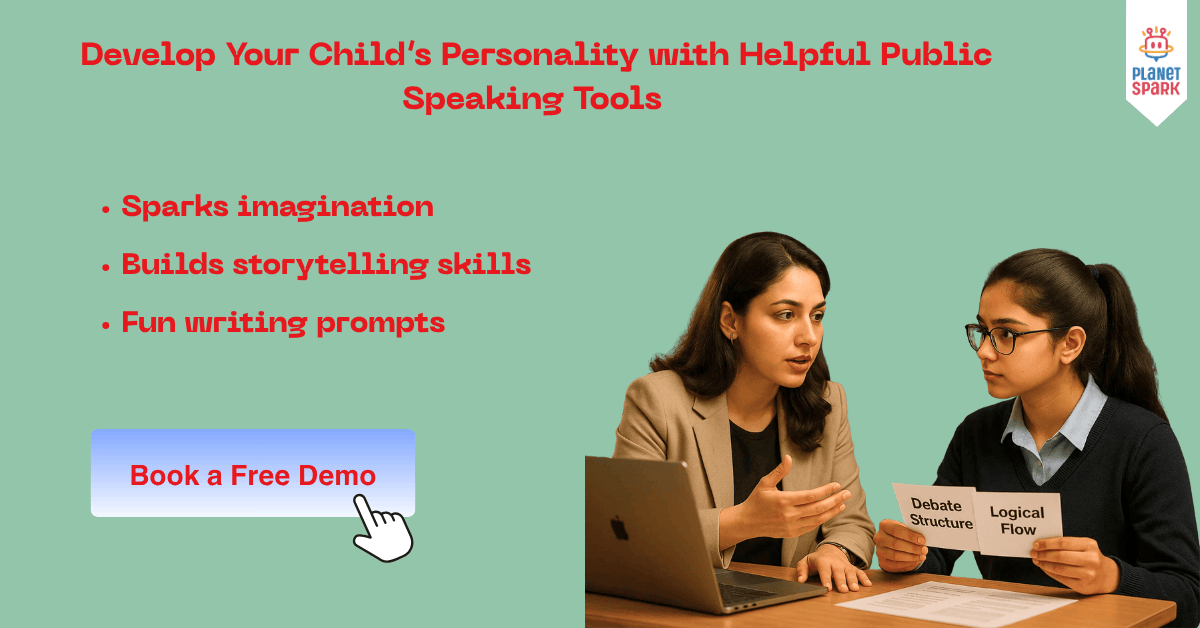Build Debate Skills with Logical Thinking | PlanetSpark
Last Updated At: 30 Jul 2025
9 min read

Table of Contents
- Why Logical Thinking Matters in Debate
- What Is Logical Thinking?
- Logical Thinking Meets Debate
- Why Logical Thinking Is Essential for Kids
- Components of Logical Thinking
- Core Elements of Logical Thinking in Debate
- Logic and Debate Matter: Evidence and Outcomes
- Research Skills & Perspective Awareness
- Cognitive Foundations of Logical Reasoning
- Practical Examples of Logical Thinking
- Strategies to Cultivate Logic & Debate Skills at Home
- How Debate Strengthens Thinking & Communication
- Practical Activities to Level Up Logic & Debate Skills
- Why Logic & Debate Skills Matter for Kids
- How PlanetSpark Builds Logical Thinkers
- Conclusion: Build Logical Debate Skills for Life
- Frequently Asked Questions
Logical thinking in debate is a vital skill that helps children develop critical reasoning, structured communication, and confidence in presenting their point of view. With the increasing importance of communication skills in school and beyond, building a strong foundation in logical thinking is no longer optional—it’s essential.
PlanetSpark offers world-class Public Speaking Courses that help children enhance their debating, presentation, and logical reasoning skills in a structured, fun, and engaging manner. From live interactive sessions to AI-powered feedback and personalized trainers, PlanetSpark is your child’s partner in their journey to becoming a confident communicator and logical thinker.
In this comprehensive guide, we’ll explore how logical thinking impacts debate skills, its components, practical strategies to improve logical thinking, and how PlanetSpark’s advanced tools amplify your child’s growth.
Why Logical Thinking Matters in Debate
In debate, logical thinking helps children craft coherent, persuasive arguments and spot flaws in opponents’ reasoning. It transforms opinion into conviction and ensures responses are rooted in logic rather than emotion.
Schools may introduce debate activities, but structured training—such as PlanetSpark’s model—makes children truly excel by combining logic with public speaking and critical analysis.
What Is Logical Thinking?
Logical thinking is the ability to analyze information objectively, spot relationships, and draw reasoned conclusions. It underpins critical reasoning, accurate decision-making, and effective communication.
For growing minds, logical thinking is a developmental necessity:
Enhances problem-solving and academic performance
Bolsters decision-making
Reinforces communication and debate skills
Well-trained logical thinkers can stay composed under pressure, rebut effectively, and construct arguments with clarity.
Logical Thinking Meets Debate
Logical thinking enables children to analyze situations, assemble evidence, and deliver persuasive arguments. Coupled with public speaking and debate training, it becomes a potent skillset, strengthening confidence, communication, and critical reasoning.
Educational platforms like PlanetSpark structure this development through live coaching, AI feedback, clubs, and gamification, making logic-building both effective and fun.
Why Logical Thinking Is Essential for Kids
Teaching logic sets children up for lifelong success. According to SkillsYouNeed and ParentCircle, debating improves critical thinking, structured communication, and self-esteem by encouraging children to prioritise key points and anticipate counterarguments.
Debates also instill perspective-taking and articulate expression, skills that thrive in academic, social, and future professional contexts.

Components of Logical Thinking
PlanetSpark and educational research define four core components:
1. Deduction
Using general truths to form specific conclusions.
“All mammals have lungs... therefore a whale has lungs.”
2. Induction
Generalizations drawn from observations.
Frequent rain last week suggests today could rain too.
3. Causal Inference
Identifying cause-effect relationships.
Yawning in class might imply lack of sleep.
4. Analogy
Using known situations to understand new ones.
Like a seed grows into a tree, reading regularly builds vocabulary.
These components build a strong foundation for structured debate and reasoning.
Core Elements of Logical Thinking in Debate
The four pillars:
Deduction—applying general principles to specific cases
Induction—deriving patterns from observations
Causal Inference—linking cause and effect sensibly
Analogy—drawing parallels to organize new ideas
These structures facilitate clear thinking and effective rebuttals in debate.
Argument mapping
Visual tools like argument maps clarify premises, conclusions, rebuttals, and assumptions, helping students analyze and structure debate evidence.
PlanetSpark’s public speaking course builds articulation and courage. Book a free trial session and witness the change yourself.
Logic and Debate Matter: Evidence and Outcomes
Debate as a pedagogical tool: tracing roots back to ancient Greece, classroom debate enhances reasoning, synthesis, and critical thinking.
Students in debate show stronger analytical skills and information evaluation compared to traditional writing or discussion-only formats.
Language development & communication: Debates boost vocabulary, fluency, argument structure, and persuasion ability.
Critical thinking growth: Active debate promotes perspective-taking, empathy, and open-minded reasoning.
Research Skills & Perspective Awareness
Beyond foundational logic, high-quality debate skills require research proficiency and empathy:
Research Skills: Children must deeply understand their topic and opposition viewpoints to debate effectively.
Empathy & Listening: Effective debaters listen actively and construct rebuttals with respect, building interpersonal skills and open-mindedness.

Cognitive Foundations of Logical Reasoning
Neuroscience and development
Logical reasoning is tied to executive functions: working memory, flexibility, and impulse control, rooted in prefrontal cortex maturation.
The shift from concrete to abstract reasoning is critical and challenging; supported learning, scaffolding, and peer interaction ease this progression.
Metacognitive & pedagogical strategies
Socratic questioning helps children probe assumptions and infer deeper truths, strengthening critical reflection.
Cognitive apprenticeship methods (modeling, coaching, articulation, reflection, exploration) nurture logical and metacognitive strategies in learners.
Practical Examples of Logical Thinking
Examples of applying logic in real-world contexts:
Structuring arguments for social studies debates
Planning homework schedules based on effort and time
Predicting energy dips from skipping breakfast
Choosing whether to save or spend pocket money
These activities encourage kids to draw rational conclusions backed by observation and reasoning.
Your child’s journey to powerful communication starts here. Claim your free trial with PlanetSpark and watch their confidence soar.
Strategies to Cultivate Logic & Debate Skills at Home
Ask Open-Ended Questions
Foster thinking by asking “Why?” and “What if?”, encouraging deeper reasoning.
Encourage Reading – Especially Mysteries
Mystery books naturally engage logical reasoning as children piece together clues to solve the plot.
Foster Creativity
Creative tasks broaden perspective, helping them explore arguments from multiple angles.
Promote Social Interaction & Debate Practice
Mock debates at home teach structuring arguments and respectful rebuttal.
Logical Games & STEM Activities
Puzzles, coding robots, or LEGO builds help develop reasoning and problem-solving.
Reduce Stress & Practice Mindfulness
A calm environment supports clear thinking and logical processing.
Assign Responsibilities
Tasks like organizing, caring for pets, or planning routines teach planning and logical sequencing.
Encourage Decision-Making
Let kids weigh pros and cons before deciding—this builds analytical reasoning and confidence.
Keep a Reflection Journal
Spark Diary-style writing deepens clarity of thought and self-awareness.
How Debate Strengthens Thinking & Communication
Participating in structured debates helps kids:
Use logical reasoning and structured thinking
Communicate persuasively and clearly
Build empathy, active listening, and public speaking confidence
Debate exercises foster resilience, spontaneity, and the ability to respond thoughtfully.
Practical Activities to Level Up Logic & Debate Skills
| Activity | Purpose |
|---|---|
| Mock debates on real-world topics | Practice structuring, persuasion, rebuttal |
| Logic games & puzzles (chess, Sudoku) | Boost pattern recognition, planning |
| Argument mapping exercises | Visualize argument structure clearly |
| Socratic-style discussions | Deepen questioning and assumption analysis |
| Reflection journals | Organize ideas, develop clarity, reinforce logic |
Why Logic & Debate Skills Matter for Kids
Debate catalyzes critical thinking, requiring children to analyze, research, and construct persuasive arguments.
Logical thinking structures thinking, reduces bias, and enables evidence-based expression.
Cognitive development studies affirm that exposure to reasoning challenges strengthens executive function and abstract thought.
Collaborative learning and questioning strategies notably improve reasoning depth and resilience under pressure.
At PlanetSpark, one session is all it takes to spark a love for public speaking. Join a free trial class and experience our interactive teaching first-hand.
How PlanetSpark Builds Logical Thinkers
PlanetSpark’s advanced ecosystem nurtures logic and debate through tailored learning and technology:
1. 1:1 Personal Trainers for Every Child
Certified trainers understand each child’s pace and style, delivering personalised guidance on fluency, storytelling, grammar, debating structure, and critical thinking.
2. Personalised Curriculum & Learning Roadmap
Assessments identify gaps; progress is tracked and learning goals updated continually, ensuring each child progresses meaningfully.
3. SparkX – AI‑Enabled Video Analysis Tool
Video submissions are analysed for clarity, body language, sentence structure, confidence, and logical flow, providing actionable feedback.
4. AI‑Led Practice Sessions
Virtual coaching reinforces structured speaking, grammar control, pacing, and fluent delivery outside live sessions.
5. Spark Diary – Digital Journal Platform
Children write daily reflections, speeches, and stories to improve clarity, expression, and reasoning over time.
6. Gamified Learning
Interactive quizzes and challenges (e.g., Grammar Guru, Word Wisdom) make logic and vocabulary building engaging.
7. Structured Parent‑Teacher Meetings (PTMs)
Regular collaborative reviews discuss performance, challenges, and future strategy.
8. Comprehensive Progress Reports
Reports cover critical thinking, content quality, confidence, grammar, body language, and provide trainer notes and action plans.
9. Exclusive Clubs & Learning Communities
Debate Club, Story Writing Club, Speech Circles, Podcasting Guilds, and more promote peer interaction, logic development, and public presentation.
10. Sparkline – Safe Sharing Platform
A moderated internal space for kids to post speeches or stories, building digital confidence and receiving peer feedback.
11. Contests, Showcases & Recognition
Regular events provide platforms to practise logic, earn recognition, and experience live audiences.
12. SparkBee & SparkShop
Daily grammar/vocabulary games and affordable eBooks reinforce language foundation and logical structure.
This ecosystem ensures children learn logic, debate structure, and confident communication in a personalized and engaging environment.
Conclusion: Build Logical Debate Skills for Life
Logical thinking is the cornerstone of effective debate. Cultivating it early equips children to analyse information, build structured arguments, and communicate persuasively. By combining research, empathy, creativity, and practice, children gain confidence and clarity across disciplines.
PlanetSpark’s Public Speaking Courses amplify this journey through personalized trainers, AI tools, gamification, and community learning, transforming logic and debate skills into lifelong assets.
Ready to empower your child with logical reasoning and powerful communication? Enroll now in PlanetSpark’s Public Speaking & Logical Thinking program!
Frequently Asked Questions
1. At what age should a child begin learning logical thinking and debate skills?
Children can start foundational reasoning and public speaking as early as age 4–5; structured debate formats are more effective from around age 7 or older.
2. How important is research for debate success?
Very important—effective debaters know their topic deeply and anticipate opposing viewpoints. Research helps students argue convincingly and rebut intelligently.
3. Can logical thinking skills benefit academic subjects beyond debate?
Yes. Logic and reasoning help in math, science, writing, and problem-solving across disciplines. Howard Gardner’s model highlights logical-mathematical intelligence as essential for academic success.
4. How do empathy and listening tie into debate?
Debate isn’t only speaking, it includes active listening and responding with respect. These interpersonal skills foster teamwork and broader understanding.
5. What tools can parents use to build logic at home?
Ask open‑ended questions, encourage reading (especially mysteries), play logic-based games, involve them in daily decisions, assign responsibilities, and host friendly debates.
6. Is online debate training as effective as live classes?
Yes. Virtual debate platforms with live coaching, feedback, and peer interaction can deliver similarly impactful results at home.
7. How does PlanetSpark measure and track progress in logic and debating?
Through trainer feedback, SparkX AI reports, structured progress reports, PTMs, gamified learning, and participation in clubs and contests, PlanetSpark ensures measurable and steady growth.
Personalized Communication Report
Record a video to get a AI generated personalized communication report for your child
Select Learner's Class

Hi There, want to try these
tips for your child with
LIVE with our expert coach?
Let's check your child's
English fluency
